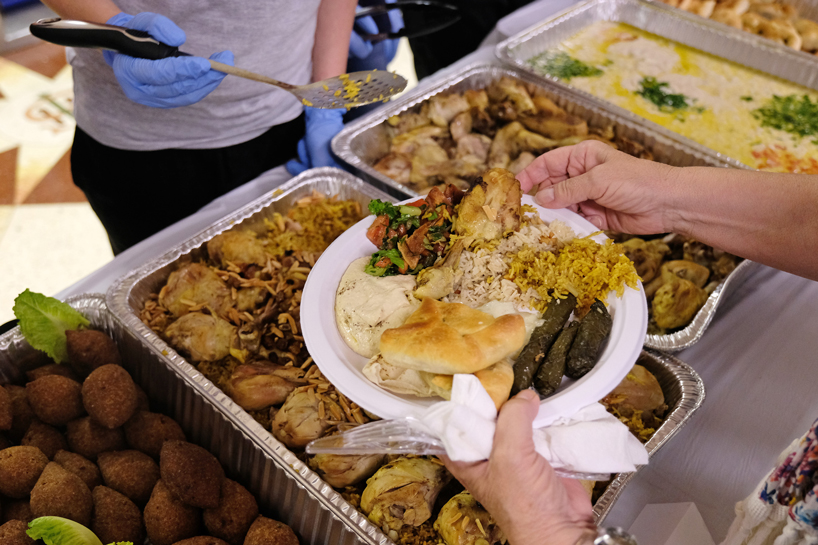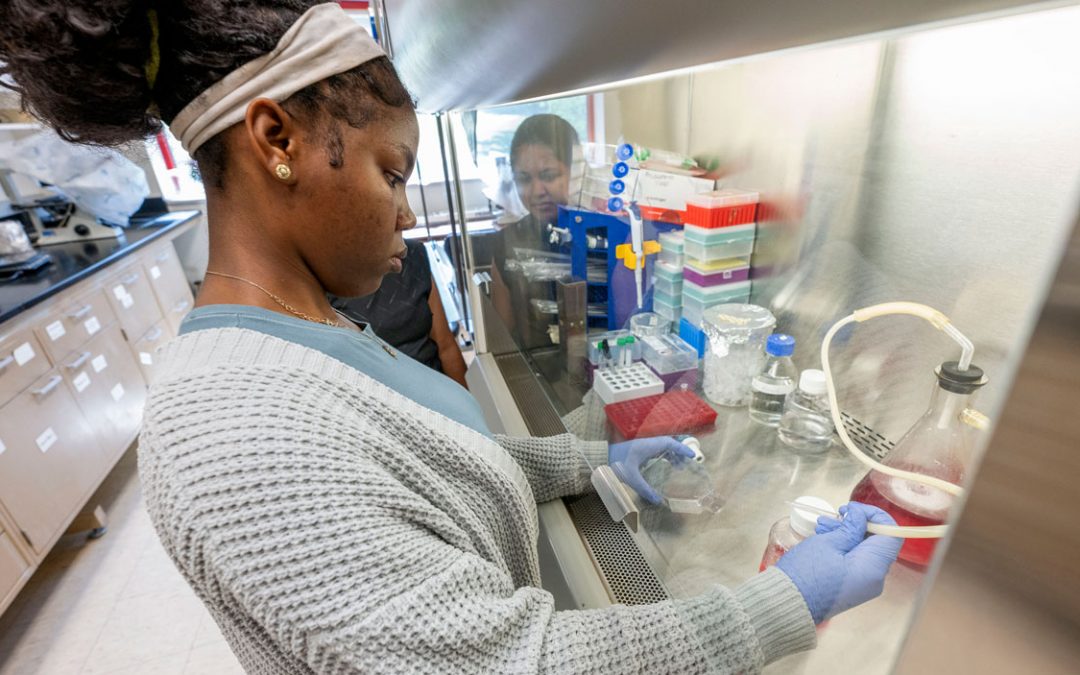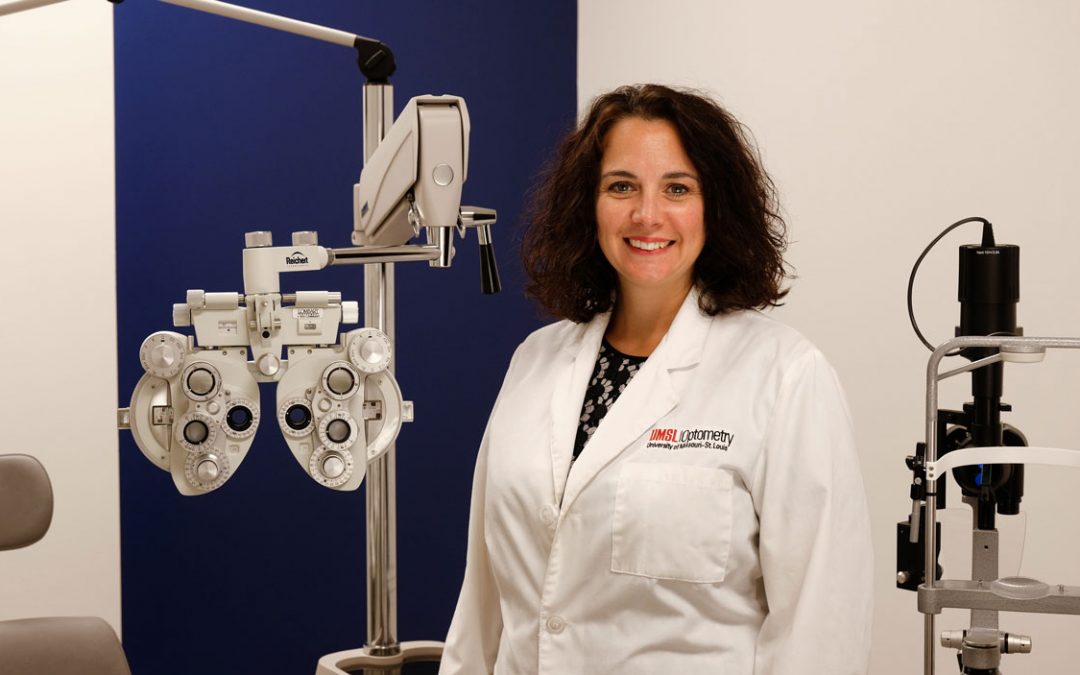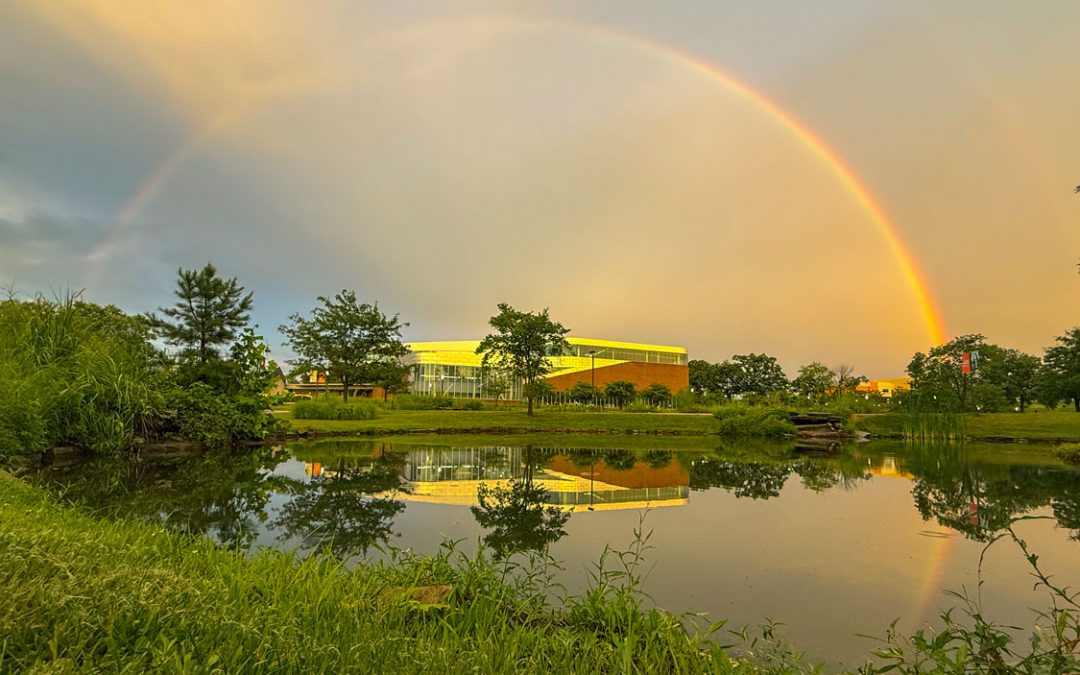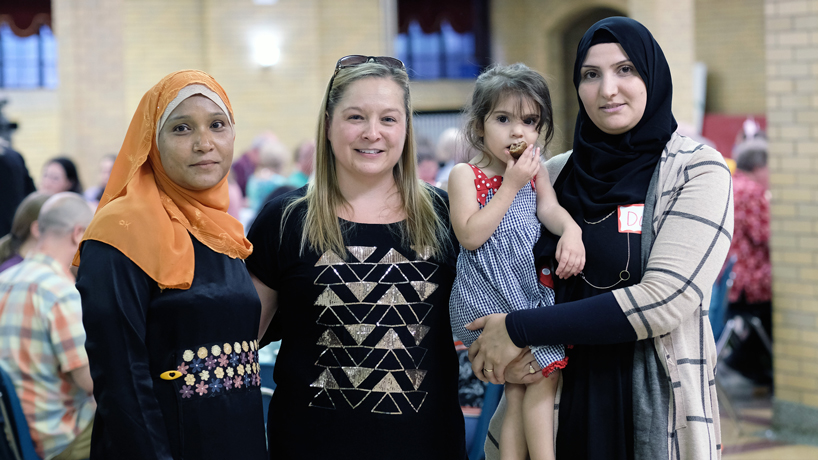
Business alumna Jessica Bueler (second from left) founded the nonprofit Welcome Neighbor STL in 2016 to improve the lives of refugees settling in St. Louis. She’s helped 30 women, including Badur Mohmaed (at left) and Duaa Alzatari (at right) earn meaningful incomes through the organization’s frequent supper club events. (Photos by August Jennewein)
It was a typical day when Jessica Bueler’s heart broke.
She headed to work in the Delmar Loop and stopped to pick up a copy of the Riverfront Times as she usually did. The marketing professional flipped through the paper that November morning, pouring through the week’s headlines before focusing on a soul-crushing story.
She didn’t have any particular attachment to the article. She didn’t know the sources. She didn’t have existing knowledge about the central problems of the piece. But Bueler did know two key things.
She knew her proximity to where four young Syrian refugees had been attacked and recognized she had to do something about it.
“I had this moment where I pictured all of these people in St. Louis reading this article and going, ‘Oh my God. That’s terrible,’ and then turning the page to the next thing,” she said. “I thought at that moment, ‘Well, what are you going to do about it, Jessica?’”
Bueler’s response to that simple yet powerful question has consumed much of her time in the years since. Her answer is Welcome Neighbor STL.
Creating meaningful change
The growing community group has provided wide-ranging support to immigrants and refugees who’ve settled in St. Louis in the time since the 2016 article.
Bueler, a University of Missouri–St. Louis alumna, spends anywhere from 40 to 80 hours per week building the organization and managing its 1,500 volunteers.
“Our mission is to provide support as refugees build their lives in St. Louis,” she said. “That could be a very broad scope in terms of what we can do for people. We did it that way on purpose because what you might need today is going to be different from next year and three years down the road. That allows us to be able to grow with them.”
Soon after reading about the attack, Bueler called a friend and owner of Ranoush – a Syrian influenced restaurant – to see how she could help. That conversation led her to a local pediatrician who advised that she start by helping with the community’s basic needs: self-care items.
So Bueler started a toiletry drive around the Delmar Loop to collect these essential but often overlooked products. She assumed the response would be small but meaningful – maybe 20 or 30 boxes filled with items like shampoo and tissues.
By the end of the collection period, she was tripping over stacks of donations that filled two truck beds and fielding more volunteer calls than she could manage.
Then it became time to deliver the toiletries, and Bueler quickly understood her work was just beginning. She walked from door to door and became increasingly overwhelmed by how unstable living conditions, violence and lack of work were impacting these families.
Her heart broke once more.
Badur Mohmaed, a refugee from Iraq; Duaa Alzatari, a refugee from Syria; and Bueler dish up cuisine during a supper club event on June 14 at the St. Margaret of Scotland Catholic Church. Welcome Neighbor has hosted 72 other dining events, raising more than $111,000 to directly benefit refugee families.
Breaking bread
To provide meaningful change, Bueler decided she needed to help people settle and feel accepted by those already established in the community. This prompted the network of Welcome Neighbor volunteers, which grows on a weekly basis. This group of mentors and friends assist with a variety of projects ranging from translating mail to addressing medical concerns.
But more than anything, this group enjoys dining and being together.
Welcome Neighbor’s flagship program is frequent supper club events that gather St. Louisans for traditional cuisine prepared by refugee women. The donation-based events directly benefit the female cooks and allow the women to share their stories, blend cultural boundaries and earn meaningful incomes.
To date, Bueler and Welcome Neighbor’s database of 30 cooks have hosted 73 supper clubs, raised $111,000 and fed more than 3,700 people.
The June 14 supper club buffet prepared by Welcome Neighbor cooks included dishes such as baba ganoush, shawarma and baklava.
“We started the idea with the supper club events and got one woman going and another and another,” she said. “We’re trying to expand it to be more and more people and bring people together with food. It’s such a time where everything is divisive. We focus on bringing people together and finding our commonalities. What better way to do it than breaking bread together?”
As the organization evolves, food has stayed a central theme. In June, Welcome Neighbor began partnering with St. Louis Teens Aid Refugees Today for meal delivery to homebound and disabled veterans. The refugee chefs, which are all ServSafe Food Handler certified, create nutritious ethnic dishes with no cost to the recipients.
On Sundays, Welcome Neighbor representatives also bring meals to the homeless population near the Soldiers Memorial Military Museum with the hope of supporting the St. Louis community.
“Of our 30 cooks, every single one is involved in doing something to contribute to the St. Louis community,” Bueler said. “Their business plans include something to give back to St. Louisans in the same way that St. Louisans have given to them.
“So many people look at refugees as people who come to the United States to take from our government and our system. We are rewriting that narrative that people are not coming here to take away from but to add to.”
The ideal neighbor
Welcome Neighbor has received national attention for its efforts, including awards from the Syrian American Medical Society, Real Simple magazine and Nextdoor social network. Most recently, Bueler accepted the community betterment award at the Women of Achievement Ceremony on May 14 in Clayton, Missouri.
While grateful for the recognition, Bueler shows a rare form of tentativeness when talking about these accolades – preferring to direct the conversation to the organization rather than herself. But she is undoubtedly the heart behind Welcome Neighbor’s mission and the go-to source for its operations.
Until a few months ago, she hadn’t accepted a penny for her full-time work. She finds meaning in the long hours and hopes that her efforts will help unite the community of refugees and other St. Louisans.
“I think with so much negativity that we have nowadays, people are attracted to something that’s positive,” she said. “Why not be that light? Why not be that connector? Why not be the person that helps build bridges?”
Bueler’s time studying international business at UMSL helped prepare her for such an endeavor.
Before reading the influential Riverfront Times article, she had limited interactions with people of Muslim faith or Syrian descent. She did, however, understand how to communicate with people of different backgrounds and had the willingness to learn about their cultures.
“Studying international business helped tremendously when working with the refugees because that was never something that was planned for me to do,” she said. “This was all new to me, but I had the foundation and basics to know the right way to approach people, to ask the right questions.”
In the coming years, Bueler hopes to widen Welcome Neighbor’s impact, which should be possible through its new nonprofit status. Her main goals are to establish one commercial kitchen where all chefs can prepare meals, begin applying for grants and build the database of mentors.
With a full heart and desire to serve, Bueler hopes to further spread the messages of unity and empathy.
“We have all of these stereotypes and misconceptions that we just keep building upon,” she said. “The more that you can meet with somebody who is different than you and talk to them, you form a relationship that humanizes them. You don’t see people with a label of refugee. You start to say that’s my friend Lina.”


